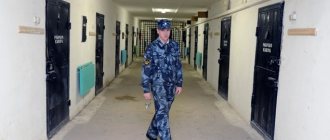Founding history
The Mozhaisk women's colony has existed since 1950. The site chosen for its founding was a former prisoner of war camp that operated during the Great Patriotic War. Initially, this correctional institution provided for serving sentences only for mothers with children. But this separation did not last long, and starting in 1953, other women began to be brought to the colony.
In 1951, an orphanage was founded in the Mozhaisk women's colony, and starting in 1956, an evening school began operating, which was designed for 200–250 people. The places where prisoners live are dormitories. There are several of them in the colony, all of them were built at different times. Currently, women serving sentences are housed in four residential buildings, the total area of which is more than 2.5 thousand square meters. m. Since 1961, industrial buildings began to be erected on the territory of the Mozhaisk women's colony. It is worth noting that the main source of income for prisoners is the garment factory, the total area of which is approximately 1.5 hectares, while the total area of the correctional facility is slightly more than 8 hectares.
There is also a sanitary unit on the territory of the Mozhaisk women's colony. About 10 highly specialized specialists, as well as service personnel, work here. The hospital is designed for 25 people, with the same number of beds. In rare individual cases, patients have the opportunity to go to the Mozhaisk Central Hospital, of course, under escort.
In 2001, on the territory of penal colony No. 5 (Mozhaisk women's colony), the Church of the Blessed Virgin Mary was opened, and a Sunday school also began to function.
GUFSIN Moscow region.
Go to: , / / / / / GUFSIN Moscow Region 143952, Moscow Region, Reutov, st. Pobeda, 13 Chief - (095) 702-60-12 Secretary - 702-60-16 Duty - 702-62-44 As part of the Main Directorate of the Federal Penitentiary Service of the Moscow Region: 10 pre-trial detention centers (and one under construction), 1 colony-settlement (and its branch ), 3 general regime correctional institutions (on the basis of IK-6 - a regional hospital, IK-5 - for women), 2 juvenile correctional colonies.
Newspaper GUFSIN - Pre-trial detention centers:
- 1. Pre-trial detention center-1 IZ-49/1 (200 places); Noginsk, l., Tolstovskaya, 5, (251)4-10-94
- 2.
SIZO-2 IZ-49/2; Volokolamsk, Gorval st., 6, (236)2-12-75
- 3.
SIZO-3 IZ-49/3; Serpukhov, Kaluzhskaya st., 50/7, (27)35-27-65
- 4. SIZO-4 IZ-49/4; Mozhaisk, Komsomolskaya sq., 7, (238)2-03-75
- 5.
SIZO-5 IZ-49/5 (300 places); Kashira, Sovetskaya st., 2, (269)3-11-78
- 6.
Official information
Address of the Mozhaisk women's colony: Moscow region, Mozhaisk district, village named after Dzerzhinsky, building 1.
Index: 143202.
Full name of the Mozhaisk women's colony No. 5: Federal government institution "Correctional Colony No. 5" of the Federal Penitentiary Service of Russia for the Moscow Region.
Brief name of the colony: FKU IK5 of the Federal Penitentiary Service of Russia for the Moscow Region.
The colony operates a service for receiving packages and parcels for convicts every day from 9.00 to 18.00. Lunch break from 14.00 to 14.30.
The head of the institution is Major Natalya Ferdinandovna Guseva.
To clarify the necessary information about the possibility of meeting with the defendant or accepting the transfer, you can send a letter to the email address of the colony
A certain time is allocated for meetings with the authorities of the correctional institution; the appointment schedule is given below:
- Monday. Guseva Natalya Ferdinandovna: 14.00–17.00.
- Tuesday. Zhuravleva Inna Anatolyevna: 10.00–12.00, 15.30–17.00.
- Thursday. Leonovich Svetlana Mikhailovna: 10.00–12.00. Kudryashova Elena Grigorievna – 15.30–17.00.
Relatives and close relatives of prisoners have the opportunity to make bank transfers in the name of those serving their sentences. The details of the colony can be found on the official website of the correctional institution.
Colony settlement in Moscow
A colony settlement is one of the types of penitentiary institutions.
It is intended for serving punishment by persons who are sentenced to imprisonment for criminal acts committed unintentionally, as well as punishment of persons who have committed light or medium crimes for the first time.
As a rule, these institutions are located in the North and East of the Russian Federation (there is one colony-settlement in Moscow and one in the region - Zelenograd). They are maintained with funds allocated from the federal budget. In accordance with the provisions set out in Art. 129 of the Executive Code of the Russian Federation, convicts stay in colonies without security, but under the supervision of the administration of the penitentiary institution.
During the period from wake-up to lights-out, convicts have the right to freely move around the territory of the facility, and with the permission of the administration, outside the colony.
It is also possible to live with family members not only within the institution, but also outside it.
Children's home
There is an orphanage on the territory of the Mozhaisk women's colony. Some women end up in this correctional facility when they are already pregnant, while others have their husbands come to visit them for long visits, after which children appear. It is these children who are kept in an orphanage on the territory of the colony until the age of three. Unfortunately, they have to take their first breath in places not so remote.
This children's institution is equipped for a comfortable stay for children. There are bedrooms with cribs, playrooms, a music room, a children's dining room with special tables and chairs, as well as an equipped walking area with swings and slides.
The head of the orphanage on the territory of the Mozhaisk colony is a wonderful person and an excellent specialist - Natalya Potapova, who takes her profession with full responsibility. She knows every child and easily finds an approach to them.
Colony-settlement No. 2
Photo: TODAY AND TOMORROW.
REFORMING. In accordance with the Concept for reforming the penal system until 2022, the penal system will be systematically transformed. The reform involves three stages. The first is designed until 2012. During this time, federal target programs will be developed and legislation will be amended, and a greater number of punishments alternative to imprisonment will be introduced into judicial practice.
At the second stage, from 2013 to 2016, it is planned to repurpose most of the correctional institutions into general and high security prisons, create new colony settlements, and a network of social centers for post-penitentiary adaptation.
The third stage, from 2022 to 2022, involves the completion of radical reorganization planned measures and the further development of the penal system. As a result of large-scale actions, two types of correctional institutions will remain in the country - prisons and colony settlements.
Living together between mother and child
Prisoned women with children have the opportunity to be with their children and spend more time with them. Mothers who have distinguished themselves by exemplary behavior are allowed to work not in a garment factory, but in the baby's home. They are usually offered positions as nannies or cleaners. Even though these jobs are not highly paid, the opportunity to communicate with your own child is often more expensive.
Moreover, in the orphanage there are rooms where mother and child can live together. There are two beds here: one for adults, the other for children. To live with a child, it is necessary not only to be distinguished by good behavior, but also to obtain permission from the head of the colony.
Unfortunately, not every woman tries to take advantage of this opportunity. Many simply refuse to communicate with their children, others use their kids to get parole.
Another sad fact is that almost all the children in this institution are sick. The fact is that their mothers led an unhealthy lifestyle during pregnancy. Many of them were drug addicts, and children were already born with drug addiction. Many children experience withdrawal symptoms already on the second day of life. All children have reduced immunity. The worst thing is that some children are HIV carriers from birth. After all, this disease is what distinguishes the Mozhaisk women’s colony. A large number of women serving sentences here are sick.
What is a colony-settlement
Russian legislation provides for varying measures of suppression of criminals, depending on the severity of their actions. A colony-settlement is a type of institution in which persons who have committed crimes of moderate or mild severity, or through negligence, serve their sentences. General information
The executive bodies of the Russian Federation understand that it is inappropriate to place malicious criminals together with those who stumbled through negligence or without malicious intent.
We recommend reading: Do you need an order when buying a car for legal entities?
Therefore, a system of serving sentences was implemented depending on the severity of the crimes committed. Imprisonment in a colony settlement is valid in cases where it is impossible to apply a suspended sentence to a convicted person, or to completely relieve him of actual deprivation of liberty. This
Reviews
Reviews about the Mozhaisk women's colony are quite varied, but it cannot be otherwise, because this place is very original and specific; people do not come here voluntarily. Nevertheless, according to many people who have ever visited the colony, all conditions have been created here for women, as well as for their children. Prisoners have the opportunity to earn money and help their families. In addition to earning money, the colony is also equipped for recreation during free time from work.
The location of the Mozhaisk women's colony is described above. All necessary information can be found on the official website of the institution. Here you can also find out how to get to the Mozhaisk women’s colony. We can conclude that despite the fact that prison is an unpleasant place that no one wants to go to, all the necessary conditions for women have been created in the Mozhaisk colony.
"Chemistry" and life
March 3, 2004, 00:00 GERMAN PETELIN, ANATOLY MORKOVKIN (PHOTO) Read New News in the official group Follow the most important news of the region in your friends’ feedMoscow. Kapotnya. Upper Fields Street. New buildings are being replaced by an industrial zone. We are going to the only colony-settlement in the capital - “troika”.
The oil refinery with its tall flare pipe is left behind. In front of us is a bus stop, behind it is a blue sign with the inscription “Institution UU-163/3 UIN of the Ministry of Justice of the Russian Federation” and an arrow to the left.
After a hundred meters there is a high fence. Near a checkpoint with an iron door. A man in camouflage is standing on the porch. We've arrived. Every morning, men and women rush to the bus stop from here to get to the metro and disappear into the half-asleep Moscow crowd. They are no different from those around them. Only in the pockets are not passports, but passes that allow exit from the territory of the colony, indicating the period and article.
Transfer of food and belongings to a colony for juvenile offenders
The number of parcels and parcels for juvenile prisoners is unlimited, unlike for adult prisoners.
But each parcel is taken into account in a special document. This is done by the senior colony inspector. Also, when handing over the parcel, the relative signs two statements. One remains with him, and the second - in the colony.
Expert opinion
Fedorov Alexander Grigorievich, expert in criminal law
If you have any questions, please ask me.
Transfers are regulated by Ministry of Justice Order No. 311 of 2006. If you have any questions, ask them to me.
There are a number of prohibited things that cannot be given or purchased to prisoners themselves:
- Weapon;
- Flammable and explosive substances;
- Valuables, including securities;
- Any piercing or cutting objects, including household items (razors, etc.);
- Alcohol;
- Playing cards;
- Optical instruments;
- Electrical household appliances;
- Means of communication and photo-video filming.
Items prohibited in parcels are confiscated. They are opened by the same senior inspector.









